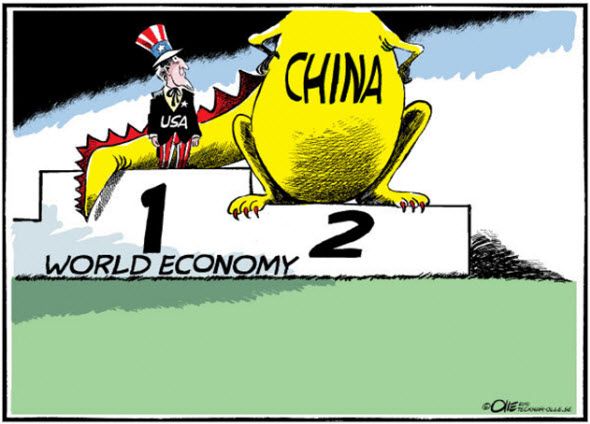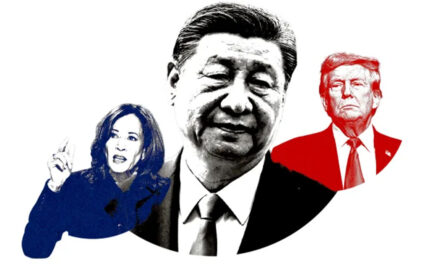
What about China?

As the world is understandably focusing on the Russian invasion of Ukraine, we are not hearing much about China. It was only a short time ago that Russia’s Vladimir Putin stood alongside China’s Xi Jinping and pledged solidarity in their opposition to American world leadership.
If Putin thinks that the meeting put him on the same level as Xi in the eyes of the world – or even in Xi’s eyes – he is badly mistaken. Putin is merely a pawn in Xi’s plan to make China the leader of the world – militarily and economically.
Xi has not joined the many nations that have condemned Putin’s folly in Ukraine, but he has not expressed a lot of support, either. There are reports that Xi is actually unhappy with his new buddy – believing that Putin’s recklessness is reflecting badly on the Chinese government.
We got the first glimpse of that when China abstained in the UN Security Council resolution to condemn Putin. The resolution was defeated by the veto of Russia. Eleven nations voted to condemn Putin. India and the United Arab Emirates (UAE) also abstained, saying the vote was doomed to fail because of Russia’s ability to veto it. Both countries, however, called on Russia to end the invasion.
To put this in a movie analogy, I see Xi as the Robert DeNiro character in Casino and Putin as Joe Pesci. The reckless psychopath killer (Pesci) is an ally of casino-operator DeNiro – but eventually creates so many problems that the mob decides he has to be eliminated. What should be disconcerting to Putin is that no one in the mob of autocratic world leaders is sticking up for him – and there appears to be some issues within Putin’s inner circle. The Madman of Moscow should probably hire a food taster if he does not already have one.
Getting back to China … we know some of the details of Xi’s plan to rule the world. In terms of suppressing internal opposition and dissent, Xi has already been largely successful. His pogrom to wipe out the Muslim Uighurs culture in western China – and re-populate the area with ethnic Chinese — is well underway. He has crushed the democracy movement in Hong Kong in violation of the agreement that returned that island province to Beijing. And he has established an Orwellian high-tech operation that tracks the activities of average citizens.
His three major international thrusts involve extending Chinese control of the South China Sea – and despite diplomatic complaints (talk, talk, talk), Xi has constructed Chinese islands as military bases where only water once existed.
Xi covets Taiwan. Like Putin, Xi claims that Taiwan is part of China – just temporarily estranged. He is correct. The big difference between Putin with Ukraine and Xi with Taiwan is that Taiwan is not considered an independent nation in the eyes of the world community. Even the United States maintains a “one China” policy – conceding that Taiwan is part of China. It is more like an official separation than a divorce.
And the third effort is to use China’s huge economic leverage to gain influence – and resources – from countries all over the world – especially in Africa. An example of influence peddling – Chinese style – was vividly seen in the generous business deals(?) with Hunter Biden when his dad was Vice President.
While Xi is willing to use military force to suppress domestic opposition and protest, he has been loathing to use it for international conquest. That is a major difference between him and Putin – and why Xi does not completely wrap his arms around the Russian despot. Rather he sees Putin as a bit of an oaf compared to Xi’s more subtle stagecraft. That is one of the reasons that Xi has not yet invaded Taiwan. He does not want to become an international pariah, like Putin.
Xi does not see Putin as a partner or an equal – but rather a person to be used and manipulated. Putin is nothing more than an ally-of-convenience – but also as a person whose recklessness makes all autocrats look bad, including Xi.
But … to the extent Putin’s bull-in-the-China-shop manner does not impact on Xi’s China shop, the chaos and disruption allows Xi to extend his soft aggression with less notice – and less pushback. It shifts the attention of the United States – and the free world – away from China. It virtually removes any attention to Biden’s Asian policies – such as they are – from the European community.
As reported in Politico, Biden’s policy “has now nearly completely collapsed, but China and the threat that it poses has not disappeared.” In fact, Jeremy Shapiro writes: “Despite the war in Ukraine, China is still America’s — and thus NATO’s — most pressing problem.” Of course, that is a view that places long-term considerations over the short-term reality. But there is some truth in it.
Some 20 years ago, I wrote of my expectation that the 21st Century would belong to China. They entered the new millennium with distinct advantages. Not only did they have much lower production costs, but they also had the largest population (market) in the world.
Because of the cost advantage, America’s manufacturers stampeded to China after the Sino Cold War ended and China liberalized all their trade and business practices. The move won them admission to the World Trade Organization. It also made China the first step in the American supply chain.
Their ability to be the source of production for the world would build their economy with growth rates often exceeding nine percent per year. That put them on track to become the largest economy in the world – and they are just short of that goal today.
And while China was a place to source products cheaply, they were not those “cheap products” of yore. China was improving its technological production to the point where western nations have become dependent of the Middle Kingdom for critical products.
Unlike Japan, China possesses vast resources – and has been using its wealth to purchase more from nations across the globe, including the United States. When you consider how Japan initially used the ability to produce cheap products into one of the three most powerful economies in the world without the huge population and natural resources, you can readily see China’s enormous advantage.
China’s technical progress is not only reflected in their factory productions but in their own high-tech industries. China is a competitor in space exploration – and more importantly, they have built one of the largest technologically-advanced militaries in the world.
China has a less obvious advantages. Despite dictatorial rule, the Chinese worker is among the most industrious in the world. Their children are among the most educated. There is a deeply rooted sense of pride – a can-do spirit that was like what was called “the American spirit” of the early industrial age.
Of course, competition is what we conservatives see as the foundation of the free-market economy. For years, we called for Communist nations to embrace capitalism. To some extent, China did – and prospered. But China put its own spin on the free-market competition by taking out the words “free” and “competition.”
China placed the heavy thumb of government on the scale in three major ways. They strategically subsidized various products and industries. They erected trade barriers. And they engaged in a wide range of illegal activities from knockoffs of popular products to using espionage to steal trade secrets.
We are not likely to see China invade any autonomous nation – and not even Taiwan, in my judgment. The latter is moving closer to the Beijing orbit with expanded trade deals, mutual business interests, and social reunification. From an isolated island, Taiwan is now mainland China’s largest trading partner.
While China may expand economic and social hegemony over the nations of Southeast Asia, it is not likely that there will be any Putin-like invasions – not even the promotion of the civil wars that we saw in Korea, Vietnam, and Laos.
Fighting China is difficult because the battleground is almost exclusively economic – and the touchpoint of those illegal trade practices.
Yes, America can rue the crushing of democracy in Hong Kong and the move away from internal democratic practices, but those are internal matters. Besides condemnatory speech, there is not much the free world can do – or is willing to do — about it, as we have so painfully seen.
The closest thing to a potential shooting event is the South China Sea. Xi is not likely to push that to the point of war even though he most surely knows that America would not engage. After Afghanistan and Ukraine, he has no reason to fear the all-powerful American military. We may see Chinese ships crossing the bow of American ships – or planes buzzing them – but there will be no serious life-threatening incidents.
All China needs is economic power. Without firing a shot, nations of the world began to shift their business and investments away from America and toward China. It was not about ideology, culture, democracy. It was all about supply-and-demand – at the onset, the supply of labor. The western world got hooked and compromised on cheap labor just as so much of Europe and NATO got hooked on Russian oil.
This is no new Cold War. In those days, Russia was sealed behind the Iron Curtain and China even more so behind the Bamboo Curtain. Neither of them is so constrained today. They are out and about in the world … doing business, making deals, and, in the case of Russia, invading neighbors.
What to do about China is a more vexing problem because it is so limited. The battleground is over trade practices and proprietary rights – and competition. Even if the United States were able to convince China to abandon all its unfair and illegal trade practices, we are still at a competitive disadvantage.
Unless America can reclaim the lead in innovation and production – or unless the Chinese economy collapses under authoritarian practices — we lose. If America is beset with stupid cultural wokeness, political correctness, and identity politics – we lose. As long as our schools are teaching weakness and victimization and personal self-centeredness – we lose. China will not have to fire a shot.
The last thing America and the West needs to fear is an alliance between China and Russia. There is not one – nor will there ever be. The relationship between China and Russia is more like the relationship between China and North Korea – or the alliance between Russia and Belarus. Those are not alliances of equal partners. It is more a form of international puppetry.
Yes, China is a huge problem — but what can be said about the Washington establishment’s understanding of the situation – and their policies in dealing with China? Not much to see there outside of a lot of talk … talk … talk.
So, there ‘tis.

























I prefer stoneware to China although the Lenox autumn pattern is quite nice. Later I plan to go drinking and really taiwan.
Lol!!!!!!!& 😄😄😄😄😄😄😄😄😄😄😄😄😄😄✅😄✅ That’s funny right there. I don’t care who you are. Good job Ben. That’s a real knee slapped. I’ll have to write that funny shit down. Keep them coming. You missed your calling. You should be a comedian. Or maybe you are. Wow!!!!!!!!!!! I’ll be laughing all day. Thanks a lot.